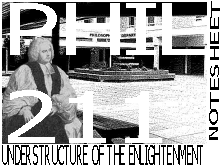 Locke 5
Locke 5 Locke 5
Locke 5Some of the arguments Locke makes in trying to establish the primary/secondary distinction:
'Let us consider the red and white colours in porphyry. Hinder light from striking on it, and its colours vanish; it no longer produces any such ideas in us: upon the return of light it produces these appearances on us again. Can any one think any real alterations are made in the porphyry by the presence or absence of light; and that those ideas of whiteness and redness are really in porphyry in the light, when it is plain it has no colour in the dark? It has, indeed, such a configuration of particles, both night and day, as are apt, by the rays of light rebounding from some parts of that hard stone, to produce in us the idea of redness, and from others the idea of whiteness; but whiteness or redness are not in it at any time, but such a texture that hath the power to produce such a sensation in us.' Essay, Bk II, Ch. VIII, Section 19
'The ideas of the primary alone really exist. The particular bulk, number, figure, and motion of the parts of fire or snow are really in them,- whether any one's senses perceive them or no: and therefore they may be called real qualities, because they really exist in those bodies. But light, heat, whiteness, or coldness, are no more really in them than sickness or pain is in manna. Take away the sensation of them; let not the eyes see light or colours, nor the ears hear sounds; let the palate not taste, nor the nose smell, and all colours, tastes, odours, and sounds, as they are such particular ideas, vanish and cease, and are reduced to their causes, i.e. bulk, figure, and motion of parts.' Locke, Essay, Bk II, Ch. VIII, Section 17.
'Ideas being thus distinguished and understood, we may be able to give an account how the same water, at the same time, may produce the idea of cold by one hand and of heat by the other: whereas it is impossible that the same water, if those ideas were really in it, should at the same time be both hot and cold. For, if we imagine warmth, as it is in our hands, to be nothing but a certain sort and degree of motion in the minute particles of our nerves or animal spirits, we may understand how it is possible that the same water may, at the same time, produce the sensations of heat in one hand and cold in the other; which yet figure never does, that never producing- the idea of a square by one hand which has produced the idea of a globe by another. But if the sensation of heat and cold be nothing but the increase or diminution of the motion of the minute parts of our bodies, caused by the corpuscles of any other body, it is easy to be understood, that if that motion be greater in one hand than in the other; if a body be applied to the two hands, which has in its minute particles a greater motion than in those of one of the hands, and a less than in those of the other, it will increase the motion of the one hand and lessen it in the other; and so cause the different sensations of heat and cold that depend thereon.' Essay, Bk II, Ch. VIII, Section 21
'Pound an almond, and the clear white colour will be altered into a dirty one, and the sweet taste into an oily one. What real alteration can the beating of the pestle make in any body, but an alteration of the texture of it?' Essay, Bk II, Ch. VIII, Section 20
"The senses at first let in particular ideas, and furnish the yet empty cabinet, and the mind by degrees growing familiar with some of them, they are lodged in the memory, and names got to them." Essay Bk II Ch. 2 Section 15.)
You have the picture of the mind of a container holding ideas, and also containing some kind of perceiver/manipulator of those ideas. It is perhaps subject to the 'homunculus' criticism.
Locke's view is that a person A existing now is the same person as person B who existed at a time in the past if and only if A remembers being B. At any rate this seems to be what Locke is saying:
'For, it being the same consciousness that makes a man be himself to himself, personal identity depends on that only ...' Locke, Essay, Book 2 Chapter XXVII Para 10
The meaning of a word is the idea it stands for.
Is a non-representational theory of how words 'mean' conceivable?
Kenny supports this account of Thomist thought:
"According to some philosophers, in sense experience we do not directly observe objects or properties in the external world; the immediate objects of our experience are sense-data, private objects of which we have infallible knowledge, and from which we make more or less dubious inferences to the real nature of external objects and properties.
In Aquinas' theory there are no intermediaries like sense-data which come between perceiver and perceived. In sensation the sense faculty does not come into contact with a likeness of the sense-object. Instead it becomes itself like the sense-object..." (Kenny, Aquinas on Mind, p.35.)
VP